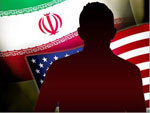 AFP: Iran and the United States on Tuesday underlined their military readiness for conflict should faltering diplomacy over Tehran’s atomic activities fail, as tensions rose over tougher Western sanctions. By Marc Burleigh
AFP: Iran and the United States on Tuesday underlined their military readiness for conflict should faltering diplomacy over Tehran’s atomic activities fail, as tensions rose over tougher Western sanctions. By Marc Burleigh
 TEHRAN (AFP) — Iran and the United States on Tuesday underlined their military readiness for conflict should faltering diplomacy over Tehran’s atomic activities fail, as tensions rose over tougher Western sanctions.
TEHRAN (AFP) — Iran and the United States on Tuesday underlined their military readiness for conflict should faltering diplomacy over Tehran’s atomic activities fail, as tensions rose over tougher Western sanctions.
Iran said it successfully fired several dozen missiles — including a medium-range Shahab-3 ballistic weapon with a range capable of striking Israel — in war games in its central desert region designed to show its capacity for counter-attack.
US officials, meanwhile, detailed a quiet US military build-up in the Gulf region that includes the deployment of warships and F-22 stealth fighter jets.
The belligerent posturing came on the day technical experts from Iran and from world powers, including the United States, were due to meet in Istanbul in the latest round of talks.
The negotiations have been downgraded from a senior political level after three previous rounds this year that failed to bridge vast differences held by each side.
Iran refuses to bow to Western demands that it curb its sensitive uranium enrichment under the pressure of punishing economic sanctions that were ramped up last week to their most severe level so far.
“The sanctions imposed against our country are the harshest and strongest ever imposed. If the enemies think they can weaken Iran with these sanctions, they are wrong,” Iranian President Mahmoud Ahmadinejad was quoted as saying by the official IRNA news agency.
Tehran is demanding its “right” to enrichment be recognised and the “hostile” sanctions be eased for the talks to progress. It rejects Western suspicions that it is seeking a nuclear weapons “break-out” capability.
Iranian foreign ministry spokesman Ramin Mehmanparast accused the Western nations in the so-called P5+1 group (comprising the United States, Britain, France, Russia and China, plus Germany) of dragging out the talks and perhaps wanting them to fail.
“Many people are starting to conclude that maybe there are specific goals in dragging out the talks and preventing their success. One option is that perhaps there is a link with the US (presidential) election” in November, he said.
Iranian Foreign Minister Ali Akbar Salehi, speaking on Monday to the ISNA news agency, said that, should the talks collapse, “the other alternative is confrontation.”
Israel, which is not party to the talks, has warned it could launch pre-emptive air strikes on Iran’s nuclear facilities to hinder what it sees as a threat by the Islamic republic to its existence.
US President Barack Obama has also repeatedly said that “all options” — including that of US military action — are on the table regarding Iran.
With that in mind, Iran on Tuesday test-fired missiles into its central desert region in war games dubbed “Grand Prophet 7” and meant to simulate counter-attacks on US military bases in Afghanistan and other neighbouring countries, and possibly on Israel.
“The message of these Grand Prophet 7 manoeuvres is to show the determination, the will and the power of the Iranian people in defending their national interests and vital values,” the number two of the elite Revolutionary Guards, General Hossein Salami, said, according to IRNA.
“It’s a reaction to those who are politically discourteous to the Iranian people by saying ‘all options are on the table’,” he said.
The launches included a Shahab-3 ballistic missile which has a maximum range of 2,000 kilometres (1,200 miles), enough to reach Israel, which is 1,000 kilometres from Iran.
Some 120 lawmakers in Iran’s 290-seat parliament have also signed on to a draft bill calling for the strategic Strait of Hormuz at the entrance to the oil-rich Gulf to be closed to oil tankers headed to Europe in retaliation for an EU embargo on Iranian crude that came into effect on Sunday.
US officials responded to the announcement of the Iranian manoeuvres with comments to The New York Times newspaper stressing that Washington would view any attempt by Iran to close the Strait of Hormuz as a “red line” triggering a US military reaction.
“The message to Iran is, ?Don’t even think about it,'” the daily quoted a senior Defense Department official as saying on condition of anonymity.
“Don’t even think about closing the strait. We’ll clear the mines. Don’t even think about sending your fast boats out to harass our vessels or commercial shipping. We’ll put them on the bottom of the Gulf.”


